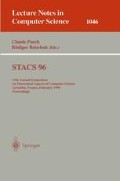Abstract
In this paper, we reconsider the definitions of procrastinating learning machines. In the original definition of Freivalds and Smith [FS93], constructive ordinals are used to bound mindchanges. We investigate the possibility of using arbitrary linearly ordered sets to bound mindchanges in a similar way. It turns out that using certain ordered sets it is possible to define inductive inference types more general than the previously known ones. We investigate properties of the new inductive inference types and compare them to other types.
This research was supported by Latvian Science Council Grant No.93.599 and NSF Grant 9421640.
The third author was supported in part by NSF Grant 9301339.
Preview
Unable to display preview. Download preview PDF.
References
A. Ambainis. The power of procrastination in inductive inference: how it depends on used ordinal notations, volume 904. Springer-Verlag, 1995. P. Vitányi, editor.
D. Angluin and C. H. Smith. Inductive inference: Theory and methods. Computing Surveys, 15:237–269, 1983.
K. Apsītis. S. Atikawa and K. Jantke, editors. Derived sets and inductive inference, volume 872. Springer-Verlag, 1994.
A. Church. The constructive second number class. Bulliten of the AMS, 44:224–232, 1938.
J. Case, S. Jain, and M. Suraj, Not-so-nearly-minimal-size program inference. In K. Jantke, editor, Proceedings of the GOSLER Workshop on Algorithmic Learning for Knowledge Processing, to appear 1995. Preliminary version presented November 1993, Dagstuhl Castle, Germany.
A. Church and S. Kleene. Formal definitions in the theory of ordinal numbers. Fundamenta Mathematicae, 28:11–21, 1937.
J. Case and C. Smith. Comparison of identification criteria for machine inductive inference. Theoretical Computer Science, 25(2):193–220, 1983.
R. Freivalds and C. Smith. On the power of procrastination for machine learning. Information and Computation, 107:237–271, 1993.
E. M. Gold. Language identification in the limit. Information and Control, 10:447–474, 1967.
S. Kleene. On notation for ordinal numbers. Journal of Symbolic Logic, 3:150–155, 1938.
P.Erdos. Some remarks on set theory, Annals of Mathematics(2), vol.44(1943), pp.643–646
L. Fortnow, R.Freivalds, W.I.Gasarch, M. Kummer, S.A. Kurtz, C. Smith, F. Stephan. Measure, category and learnng theory. Lecture Notes in Computer Science, vol. 944(1995), pp. 558–569
R. Freivalds. Inductive inference of recursive functions: qualitative theory. Lecture Notes in Computer Science, Springer, vol. 502(1991), pp. 77–100
L.Lisagor. The Banach-Mazur game. Translated vaersion of Matematiceskij Sbornik, vol. 38(1981), pp. 201–206
J. Lutz. Almost everywhere high nonuniform complexity. Journal of Computer and System Sciences, vol.44(1992), pp. 226–258
K. Mehlhorn. On the size of sets of computable functions. proceedings of the 14th Annual Symposium on Switching and Automata Theory, 1973, IEEE Computer Society, pp. 190–196
H. Rogers. Theory of Recursive Functions and Effective Computability, McGraw-Hill, 1967
W. Sierpinski. Sur la dualite entre ka premiere categorie et la mesue nulle, Fundamenta Mathemaicae, vol.22(1934), pp.276–280
Author information
Authors and Affiliations
Editor information
Rights and permissions
Copyright information
© 1996 Springer-Verlag Berlin Heidelberg
About this paper
Cite this paper
Ambainis, A., Freivalds, R., Smith, C.H. (1996). General inductive inference types based on linearly-ordered sets. In: Puech, C., Reischuk, R. (eds) STACS 96. STACS 1996. Lecture Notes in Computer Science, vol 1046. Springer, Berlin, Heidelberg. https://doi.org/10.1007/3-540-60922-9_21
Download citation
DOI: https://doi.org/10.1007/3-540-60922-9_21
Published:
Publisher Name: Springer, Berlin, Heidelberg
Print ISBN: 978-3-540-60922-3
Online ISBN: 978-3-540-49723-3
eBook Packages: Springer Book Archive

